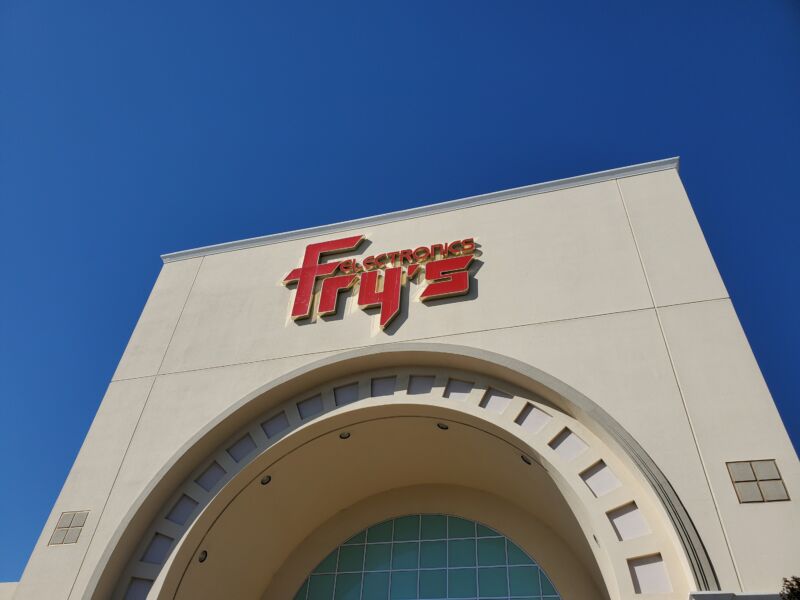
Getty Images
Fry’s Electronics, the decades-old superstore chain with locations in nine American states, appears to have gone defunct. Bay Area TV station KRON-4 was the first press outlet to confirm the news late Tuesday, saying that Fry’s will shut down all 30 of its American locations. The retailer will reportedly make an announcement at some time on Wednesday via the Fry’s website.
Rumors began flying on Tuesday in the form of anecdotes from alleged Fry’s employees, who all reported that they’d been summarily fired earlier in the day with zero notice. One anonymous report posted at The Layoff alleged that every remaining Fry’s store in the US was “permanently closing tomorrow,” and that sentiment was echoed hours later at a Fry’s-related Reddit community. The Reddit post included the allegation that one store’s staffers were tasked with shipping any remaining merchandise back to suppliers during their final day at work.
Sacramento freelance journalist Matthew Keys followed these posts by citing an unnamed source—someone who had worked at Fry’s up until “this week”—who claimed that the electronics chain would make a formal announcement “this week” about closing all of its stores and liquidating any remaining assets. As the wave of rumors exploded, the official Fry’s website began serving failure notices—yet some of its subsite content, particularly years-old press releases, remained active through Frys.com subdomains. As Tuesday wore on, the Fry’s retail site flickered into and out of normal service, even letting customers buy products after KRON-4’s report went live.
Spindles of savings
For years, Fry’s Electronics was the United States’ largest physical retailer dedicated to just about every computing and electronic device you could think of, particularly individual computer components. As the chain expanded to more stores throughout the US, particularly in taking over multiple defunct Incredible Universe locations, Fry’s rode the build-your-own boom of personal computing. If you built your own PC in the past two decades and lived within driving distance of a Fry’s, that store was likely where you began looking for motherboards, optical disc drives, RAM of all speeds and slots, and spindles of no less than 200 CD-Rs.
Additionally, the retailer was known for being the exclusive retail partner for some odd merchandise, particularly the ill-fated Pono Player from famed musician Neil Young.
Through the ’00s, cashflow across the privately held Fry’s chain was apparently solid enough to survive a devastating internal meltdown: theft of over $65 million from the company’s coffers by its then-vice president.
But big-box retailers have long struggled in an Internet-shopping era, and the California-centric Fry’s hadn’t looked particularly strong as the pandemic wore down what appetite remained for in-person shopping. Shortly before the pandemic gripped the world, the chain shut down its Anaheim, CA location, which was followed by the November closure of its Campbell, CA store.
By 2020, the chain had already established a transition to consignment-style selling, which meant not paying manufacturers up-front for merchandise before putting it on store shelves. That practice has worked for some chains with a decades-long head start on the practice, particularly Wal-Mart. But in the case of Fry’s, this transition was met by electronics manufacturers who, in the Internet-rich era of 2019, had far less incentive to put their wares unpaid onto store shelves. (This will also reduce the defunct company’s potential to liquidate, as the consignment-based merchandise must simply be returned to original manufacturers—which may have been the final duty for remaining employees this week.)
Hence, Fry’s locations began earning a notorious reputation for barren store shelves. Now, apparently, their floors will be barren, as well. The company has yet to formally acknowledge layoffs or store closures at any of its social media channels—going so far as to delete its Facebook account and “lock” its Twitter profile—and as of press time, its website has yet to offer announcements about the company’s future.
